Solar Water Heating Systems: A Renewable Energy Solution
In today’s world, where sustainability and energy efficiency are at the forefront of environmental concerns, harnessing the sun’s power to meet our daily needs is not just an option but a responsible choice.
Solar water heating systems have emerged as an innovative and eco-friendly solution for providing hot water in homes.
By utilizing the abundant energy from the sun, these systems offer a clean and renewable alternative to conventional water heating methods.
In this comprehensive guide, we will explore solar water heating systems, their benefits, installation processes, and how they outshine traditional methods.
Whether you’re an eco-conscious homeowner or simply interested in saving on energy bills, the world of solar water heating is worth exploring.
1. Overview of Solar Water Heating Systems

Solar water heating systems are designed to harness the sun’s energy and use it to heat water for domestic and sometimes commercial purposes.
These systems typically consist of solar collectors, a heat transfer fluid, a heat exchanger, and a storage tank.
The basic principle behind solar water heating is relatively simple: sunlight is absorbed by the solar collectors, which then transfer the absorbed heat to the water, raising its temperature.
This heated water is stored for use in various applications, such as showering, bathing, dishwashing, and space heating.
2. There are two primary types of solar water heating systems
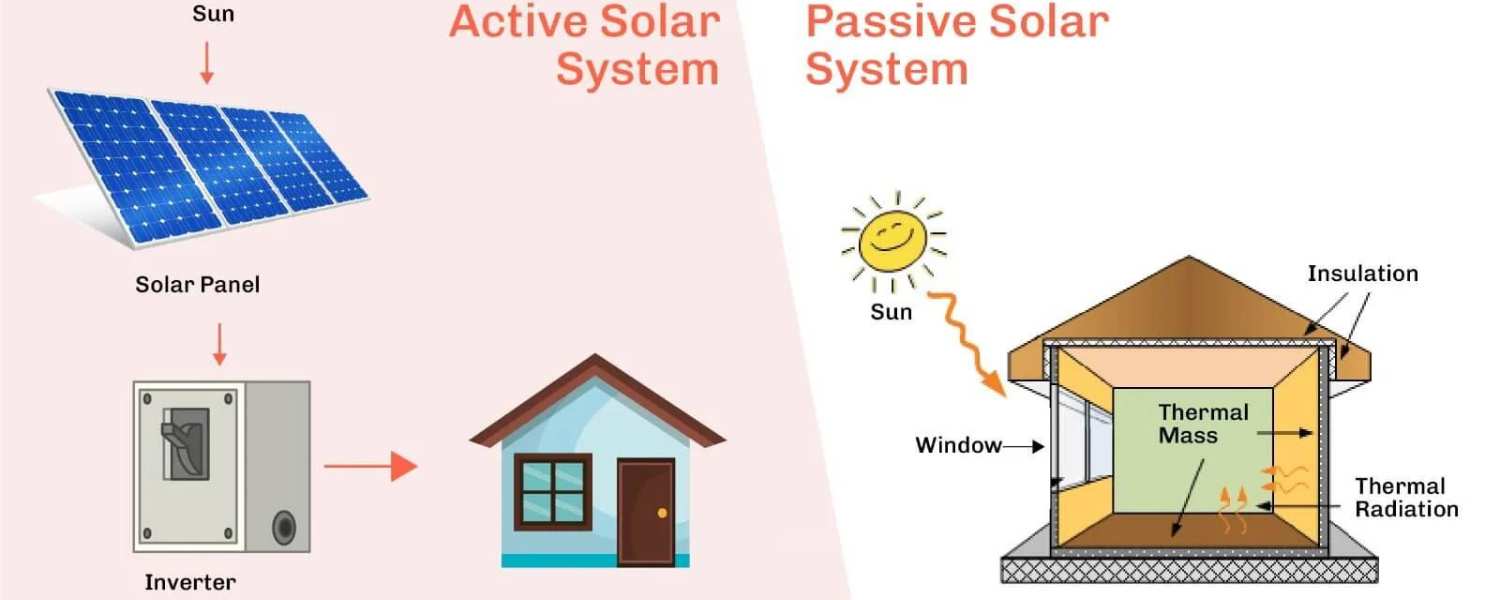
a) Active Systems
Active systems use pumps to circulate a heat transfer fluid (usually a mixture of water and antifreeze) between the solar collectors and a heat exchanger in a storage tank.
These systems are further divided into two subtypes: direct circulation systems and indirect circulation systems.
Direct circulation systems pump household water directly through the collectors, where it is heated and then sent to the storage tank.
Indirect circulation systems use a heat transfer fluid that flows through the collectors and transfers heat to the household water via a heat exchanger.
b) Passive Systems
Passive systems do not rely on pumps or other mechanical components to move heat.
Instead, they use natural convection and gravity to circulate water or heat transfer fluid between the collectors and the storage tank.
Passive systems are generally simpler and have fewer maintenance requirements, but they are typically less efficient than active systems.
Factors to Consider When Choosing a Solar Water Heating System for Homes
Selecting the right solar hot water system for your home involves considering several key factors to ensure that it meets your specific needs and preferences
i) Climate: The local climate plays a crucial role in system efficiency. Solar water heating systems are most effective in regions with ample sunlight, so consider your location and the amount of sunlight it receives.
ii) System Type: Decide between an active or passive system based on your energy goals, budget, and maintenance preferences.
iii) Collector Type: Different collector types, such as flat-plate and evacuated tube collectors, are available. Each has its own advantages and may be better suited to certain climates and conditions.
iv) Size of the System: The size of the solar water heating system should be determined by your household’s hot water usage. Consider the number of people in your home, their hot water habits, and any additional applications you plan to use the heated water for.
v) Installation Location: The location of the solar collectors is critical. They should be placed where they can receive maximum sunlight exposure throughout the day, typically on rooftops or open areas with minimal shading.
vi) Cost and Budget: Solar water heating systems require an initial investment, so carefully evaluate your budget and explore available incentives, rebates, and financing options.
3. The Benefits of Using Solar Water Heating Systems
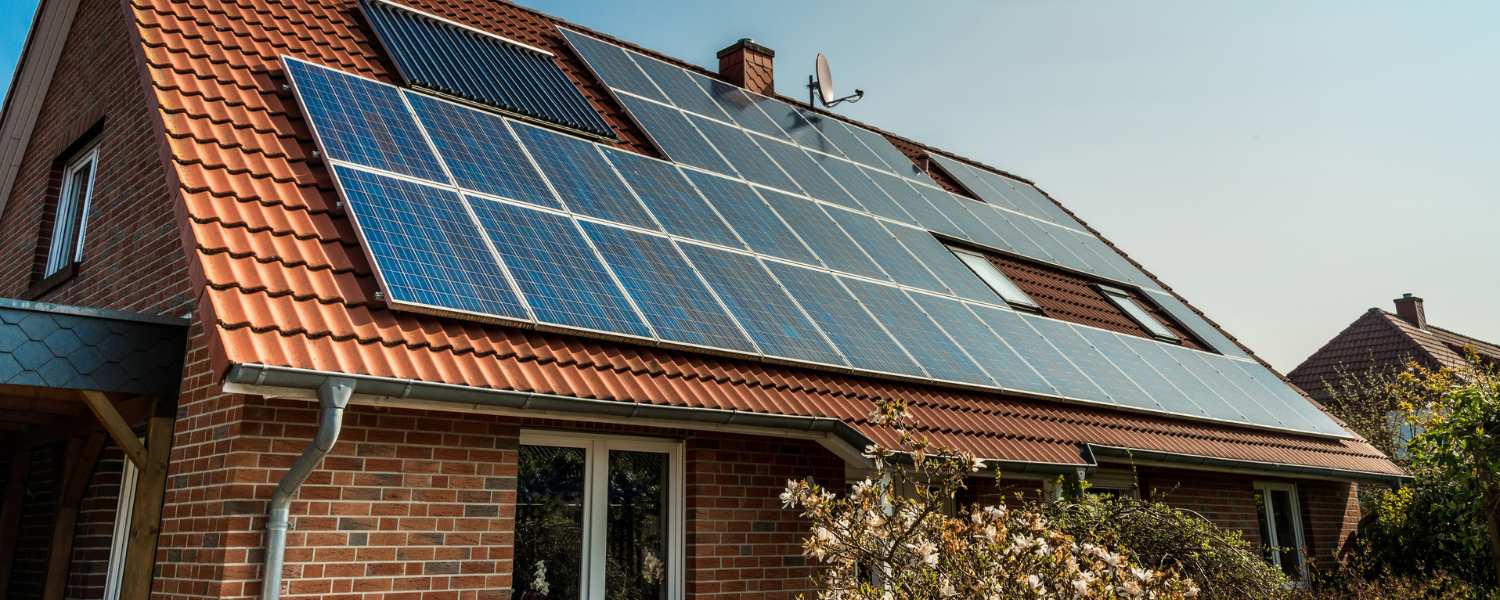
Solar water heating systems offer a wide range of benefits for homeowners, making them an attractive choice for those looking to reduce their carbon footprint and lower energy costs.
Here are some of the key advantages
i) Renewable Energy Source: Solar energy is a clean, renewable, and abundant resource, making it an environmentally friendly option for heating water.
ii) Energy Cost Savings: By harnessing the sun’s energy, solar water heating systems can significantly reduce your reliance on fossil fuels or electricity for water heating, leading to lower energy bills.
iii) Environmentally Friendly: Solar water heating reduces greenhouse gas emissions and air pollution associated with traditional water heating methods, contributing to a cleaner environment.
iv) Long-Term Investment: While an initial cost is associated with installation, solar hot water systems have a long lifespan and can provide a solid return on investment over time.
v) Low Maintenance: Solar water heating systems are relatively low maintenance, requiring occasional inspections and minor upkeep.
vi) Energy Independence: By generating your own hot water, you become less dependent on external energy sources, increasing your energy independence.
vii) Increased Property Value: Installing a solar water heating system can enhance the value of your home and make it more attractive to eco-conscious buyers.
4. The Installation Process of Solar Water Heating Systems
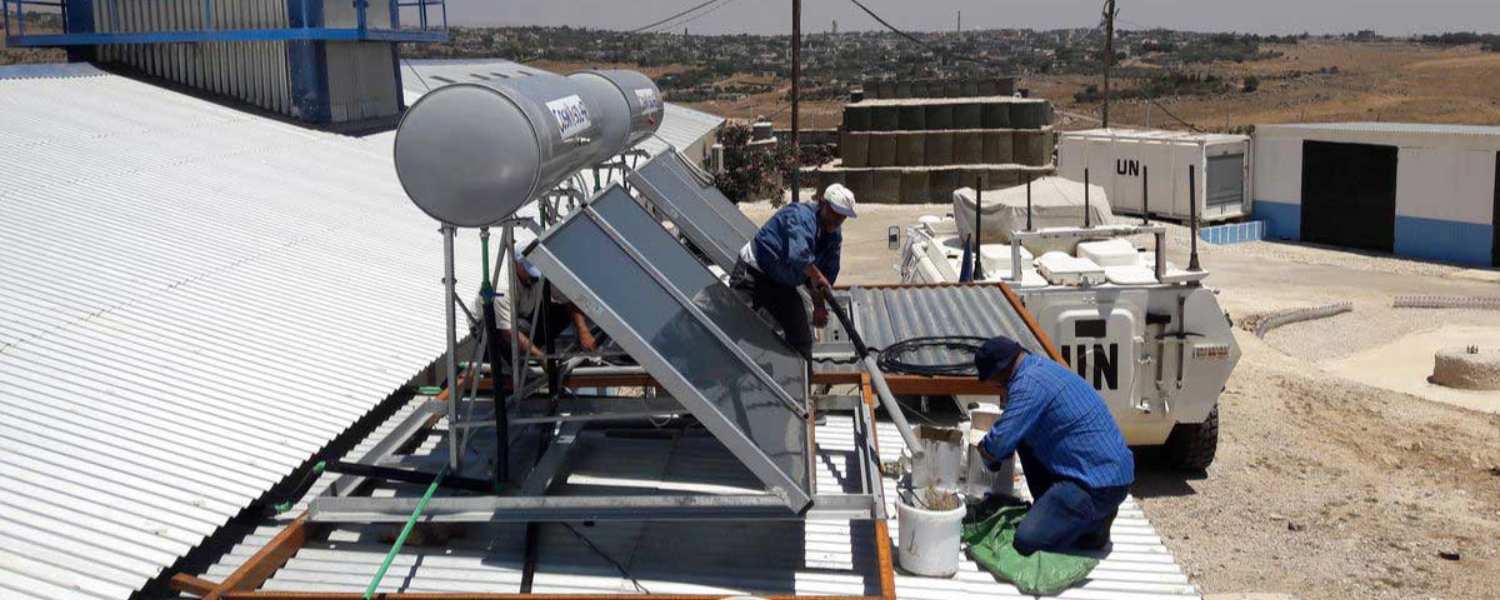
Installing a solar water heating system is a complex process that experienced professionals should carry out.
Here is an overview of the typical installation steps
i) Assessment: The first step is to assess your home’s suitability for a solar water heating system. This includes evaluating your location, roof condition, and hot water usage patterns.
ii) Design: A customized system design is created based on your specific needs and requirements. This includes selecting the type of system and collector and sizing the components.
iii) Collector Installation: Solar collectors are securely installed on your roof or another appropriate location to maximize sunlight exposure.
iv) Plumbing and Connections: The plumbing system is modified to integrate the solar water heating system. This includes connecting the collectors to the storage tank and heat exchanger.
v) Storage Tank Installation: The storage tank stores the heated water and is installed indoors or in a protected area.
vi) Control System: A control system is set up to manage the operation of the solar water heating system, ensuring efficient and reliable performance.
vii) Testing and Inspection: The entire system is tested to ensure it operates as intended and any necessary adjustments are made.
viii) Training and Maintenance: Homeowners are trained on system operation and maintenance requirements to ensure long-term performance.
5. How Solar Water Heating Systems Work
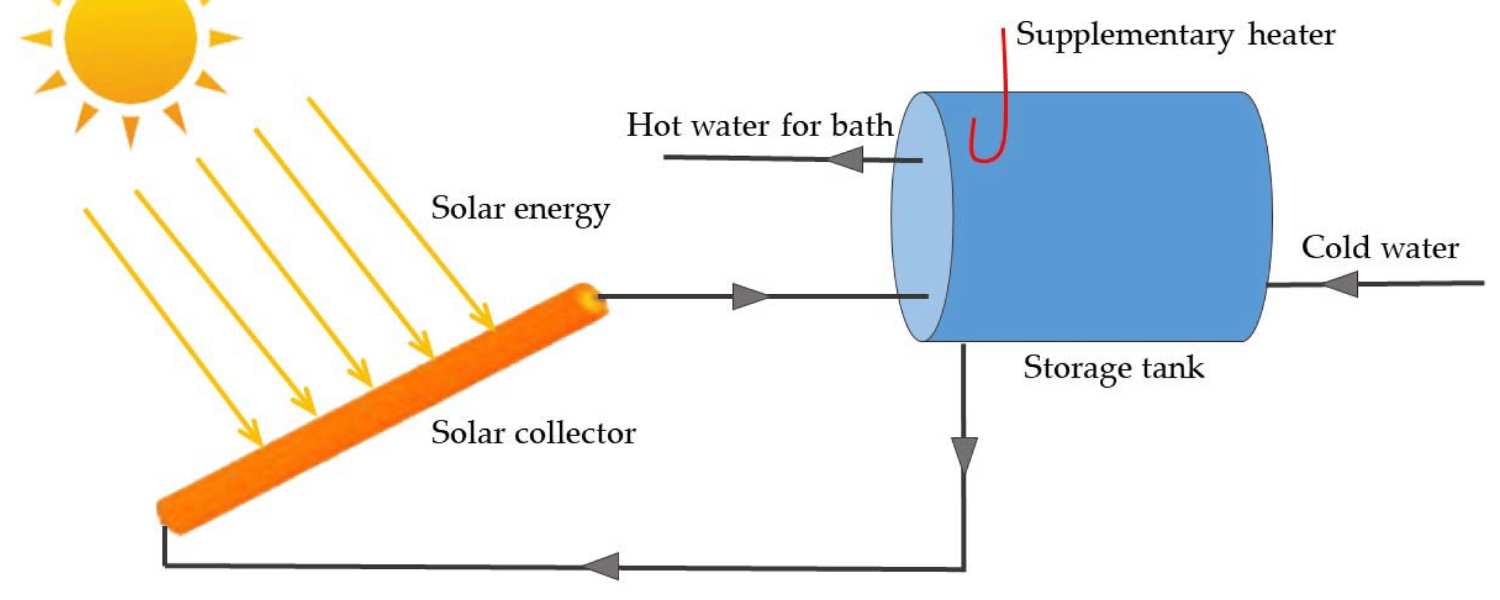
Understanding how solar water heating systems work can help you appreciate their efficiency and benefits.
Here’s a simplified explanation of the process
i) Solar Collector Absorption: Solar collectors, often mounted on the roof, absorb sunlight and convert it into heat energy.
ii) Heat Transfer: In active systems, a heat transfer fluid (usually a mixture of water and antifreeze) is pumped through the collectors. This fluid absorbs the heat from the collectors.
iii) Heat Exchange: The heated fluid then passes through a heat exchanger inside the storage tank. This heat exchange process transfers the captured heat to the water stored in the tank.
iv) Circulation: A pump circulates the heated fluid between the collectors and the storage tank in active systems.
v) Hot Water Storage: The hot water is stored in a well-insulated tank until it is needed for domestic use.
vi) Domestic Hot Water: When hot water is required in your home, it is drawn from the storage tank, preheated by solar-heated water, and delivered to your faucets, showers, and appliances.
6. The Environmental and Economic Advantages of Solar Water Heating
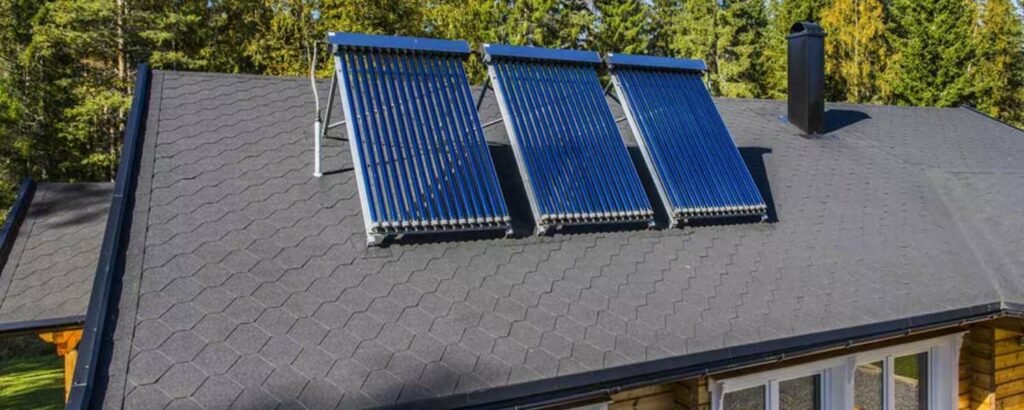
Solar water heating systems offer both environmental and economic advantages that contribute to a sustainable future.
i) Reduced Carbon Footprint: Solar water heating reduces greenhouse gas emissions and reliance on fossil fuels, helping combat climate change.
ii) Energy Savings: By utilizing free solar energy, homeowners can significantly lower their energy bills and reduce the long-term cost of water heating.
iii) Energy Independence: Solar water heating reduces dependence on external energy sources, providing greater energy security for homeowners.
iv) Reduced Air Pollution: Solar water heating systems produce no air pollutants or harmful emissions, improving air quality.
v) Renewable Resource: Solar energy is virtually unlimited, ensuring a long-term and sustainable energy solution.
7. Step-by-Step Guide to Installing Solar Water Heating
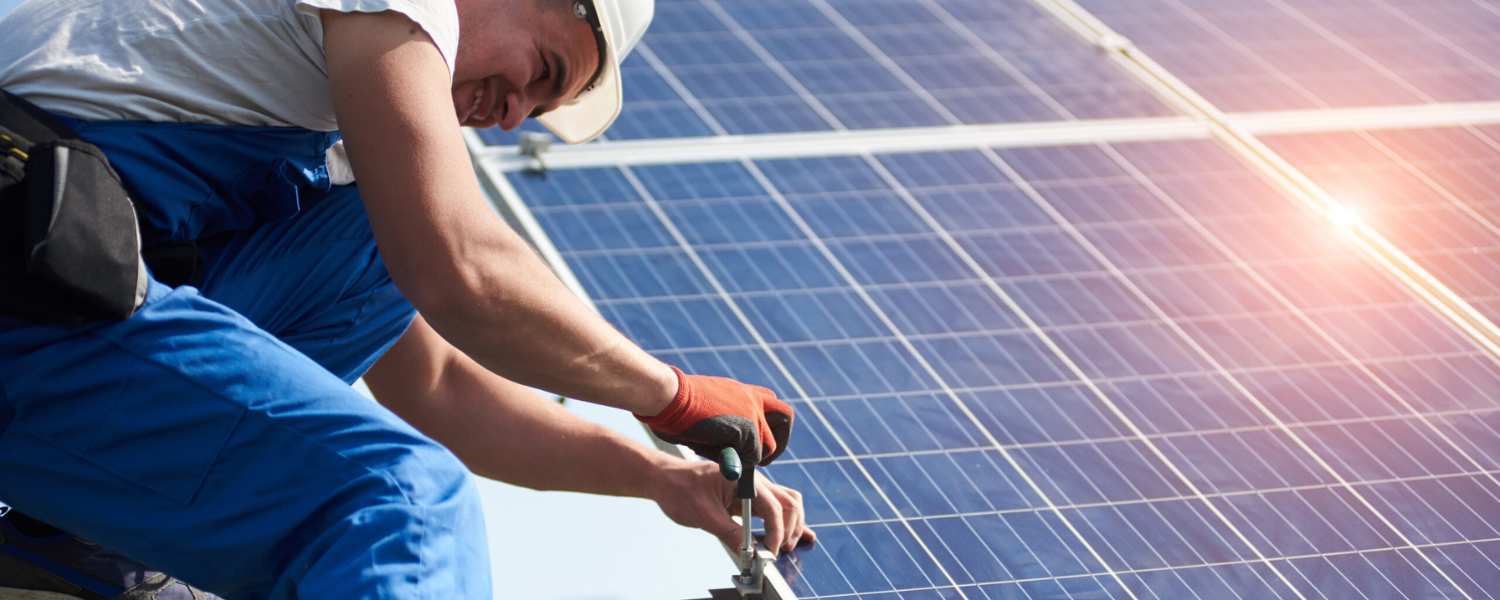
While installing a solar water heating system is a task best left to professionals, it’s essential to understand the general process involved. Here’s a step-by-step guide to help you grasp the key stages:
a) Assessment and Planning
i) Evaluate your location and determine if it receives sufficient sunlight.
ii) Calculate your hot water demand and decide on the size and type of system.
iii) Secure any necessary permits or approvals.
b) Collector Installation
i) Install solar collectors on your roof or another suitable location.
ii) Ensure that collectors are properly angled and oriented to maximize sunlight exposure.
c) Plumbing and Connections
i) Modify the plumbing system to integrate the solar water heating system.
ii) Connect the collectors to the storage tank and heat exchanger.
d) Storage Tank Installation
i) Install the storage tank indoors or in a well-protected area.
ii) Ensure proper insulation to minimize heat loss.
e) Control System
i) Set up a control system to manage the operation of the solar water heating system.
ii) Configure temperature sensors and controls.
f) Testing and Inspection
i) Thoroughly test the entire system to ensure it functions as intended.
ii) Inspect for leaks, proper fluid circulation, and temperature control.
g) Training and Maintenance
i) Provide homeowners with training on system operation and maintenance requirements.
ii) Discuss regular inspection and maintenance schedules.
iii) The Basics of Solar Water Heating System Operation
iv) Solar water heating systems are designed to operate automatically and efficiently, requiring minimal intervention from homeowners.
Here’s a basic overview of their operation
i) Solar Collector Absorption: Solar collectors absorb sunlight and convert it into heat energy.
ii) Heat Transfer Fluid Circulation: In active systems, a heat transfer fluid circulates through the collectors and absorbs heat.
iii) Heat Exchange: The heated fluid passes through a heat exchanger located inside the storage tank, transferring the captured heat to the water.
iv) Hot Water Storage: The hot water is stored in an insulated tank until it is needed for domestic use.
v) Temperature Control: A control system manages the operation of the system, ensuring that the water temperature is maintained at a desirable level.
vi) Backup Heating (if applicable): In some cases, especially during periods of low sunlight, a backup heating element (e.g., electric or gas) may be used to ensure a continuous supply of hot water.
8. Advantages of Solar Water Heating over Traditional Methods
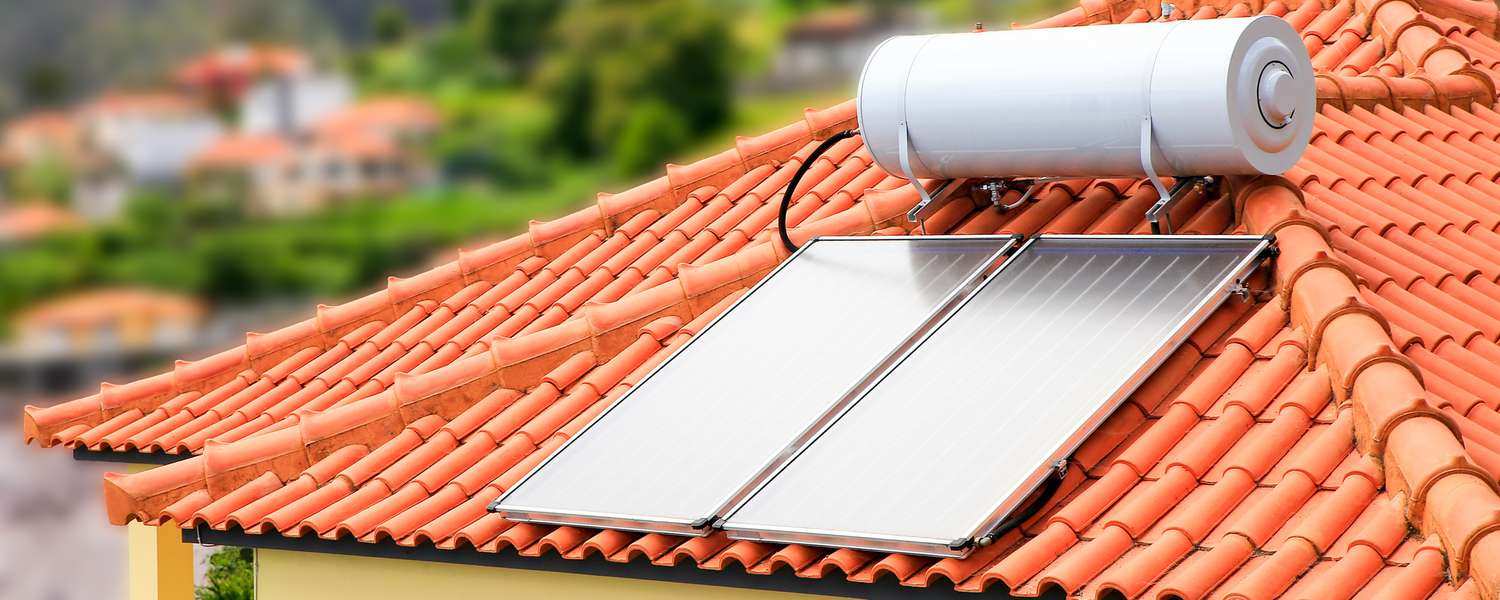
Solar water heating systems offer several advantages over traditional water heating methods, making them an appealing choice for environmentally conscious homeowners:
i) Energy Efficiency: Solar water heating systems are highly energy-efficient, harnessing free solar energy to heat water and reducing reliance on electricity or gas.
ii) Reduced Energy Costs: By using solar energy, homeowners can significantly lower their water heating bills, leading to long-term cost savings.
iii) Environmental Benefits: Solar water heating reduces greenhouse gas emissions and air pollution associated with traditional water heating methods.
iv) Low Maintenance: These systems are relatively low maintenance, with fewer moving parts than conventional water heaters.
v) Energy Independence: Solar water heating systems decrease reliance on external energy sources, providing greater energy security.
vi) Long Lifespan: Well-maintained solar water heating systems can last for decades, offering a reliable and long-term solution.
vii) Increased Home Value: Installing a solar water heating system can enhance the value of your home and make it more attractive to eco-conscious buyers.
Conclusion
Harnessing the power of the sun for your home’s hot water needs is not just an environmentally responsible choice; it’s a financially savvy one.
Solar water heating systems offer homeowners the opportunity to reduce their carbon footprint, lower their energy bills, and enjoy a continuous supply of hot water.
By understanding the principles, advantages, and installation process of solar water heating, you can make an informed decision about whether this innovative technology is the right fit for your home.
As we strive for a more sustainable future, solar water heating systems represent a significant step toward reducing our impact on the planet while improving our quality of life.
For more information and expert guidance on solar water heating systems, visit the Life Mechanical website at https://lifemechanical.ca/

